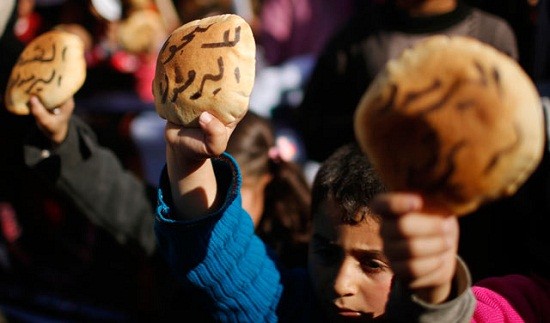
Hunger and starvation is finally taking its toll on the citizens wanting to avoid the war in Syria. All supply of food and aid to the Yarmouk camp, which houses one of the largest number of refugees of the Syrian civil unrest, has been stopped. Earlier on Wednesday reports confirmed the death of two people in the camp due to starvation.
A video report, leaked by Arabic news channel Fajer Press, shows the body of Mohammed Dib Zain, an elderly Christain, who died in the alleged blockade in the area by the Assad controlled forces. A total of 126 people have died in the refugee camps due to starvation till now, according to multiple reports.
A Twitter post by Ranya (@Raannzz) revealed that Dib Zain, who died of starvation in the Yarmouk camp, was one of the survivors of the 1948 Nakba or the Palestinian exodus. The post notes that sadly he could not survive the Yarmouk camp, as the government forces did not allow food and aid to reach the refugees.
Video - Warning: Disturbing Content
Recently, the al-Qaeda affiliated rebels - Jabhat al-Nusra - took control of areas around the Yarmouk camp, following which the Assad government forces ceased the flow of aid to tens of thousands of Syrian civilians, who are now trapped and living in desperate conditions.
Yarmouk has been the hardest hit by the Syrian conflict, primarily due to its strategic location in the south of Damascus, which is largely controlled by rebel forces. Since it is a valuable supply line to rebel fighters, it has attracted heavy government artillery strikes that have decimated large parts of the neighborhood.
Both the rebels and the Assad government forces have been trying to gain control in the area. An independent commission of inquiry set up by the United Nations in a report released on Wednesday blamed the Assad government for "employing siege warfare, instrumentalising basic human needs for water, food, shelter and medical care as part of its military strategy". The commission, which includes legendary former war crimes prosecutor Carla del Ponte, stressed that more than 250,000 people remain besieged in the war-ravaged country.
The report also noted that civilians living in areas controlled by the jihadist Islamic State of Iraq and Syria (ISIS) around the Raqqa province were being systematically subjected to "severe physical or mental pain or suffering" which amounted to crimes against humanity.
The commission, headed by Paulo Sérgio Pinheiro, has been tasked by the United Nations Human Rights Council to investigate and record all allegations of crimes against humanity and war crimes, and its mandate was recently expanded to include "investigations of all massacres".










